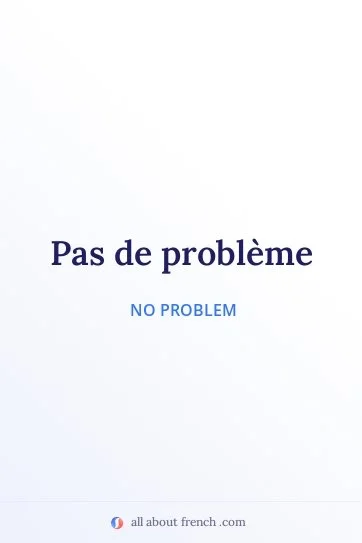
Are you ready to learn everything you want to know about the basic phrase "Pas de problème"? This include a complete guide of what it is and how to use it in a dialogue with an audio example. But that's not all, we also added some useful things like dialogue example, synonyms, slow pronunciation audio and more!
Translation : No problem
Register : Informal - Basic
Slow
Normal
IPA : / pa də pʁɔblɛm /

It literally means:
"Pas de problème" is one way to say in French "No problem", "No worries", "Don't worry about it", "It's not serious" or "That doesn't matter". It's basically the shortened version of "Il n'y a pas de problème" which literally means "There is no problem".
It's a very popular expression that we use to reassure someone after something happened. Typically: to minimize an issue, clearing up a misunderstanding, or to reassure about our wellness after an unfortunate event.
Let's see some examples!
Scenario 1: your boss tells you that you will have to work on Sunday and want to be sure you are ok with that. You can answer: "Oui, pas de problème, je serai là." (Yes, no problem, I will be there). Or "N'y pense même pas, dimanche je dors." (Don't even think about it, on Sunday I'm sleeping.) But that's another story...
Scenario 2: you are falling off stairs and then someone comes to ask you if you are ok. You might say: "Pas de problème, je vais bien." (It's not serious/Don't worry about it, I'm fine)
There is an infinite number of synonyms, here are the most used ones:
Neutral
Informal
↓ Example in a story with slow French audio ↓
Finally, let's see an example in a parallel story with slow audio.
La rencontre
The encounter
10%
The story just started!
Get full access to 365 texts and quizzes, including this one.
 Discover more
Discover more Already a member? Full story and quiz here.
